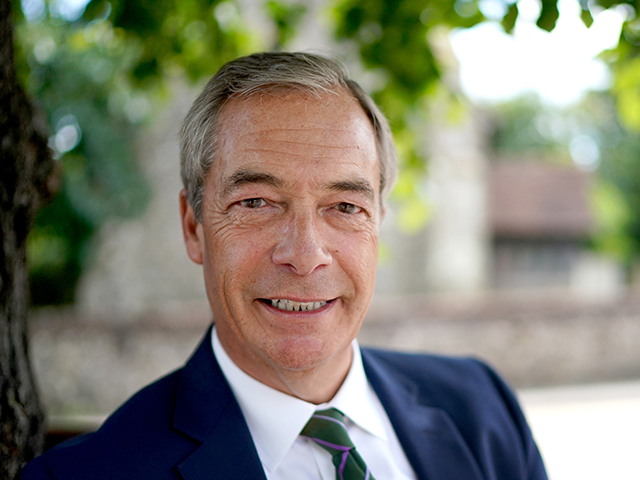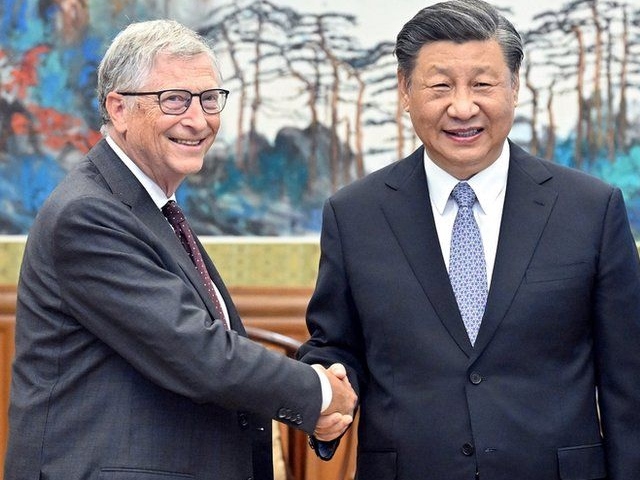China’s state-run CGTN produced an interview with Tsinghua University dean Pan Qingzhong on Tuesday that celebrated corporate Environmental, Social, and Governance (ESG) programs and boasted of China’s passionate love for the concept, which closely mirrors Communist dictator Xi Jinping’s concept of “socialism with Chinese characteristics.”
Green #CIFTIS2023: Why is ESG so popular in China? pic.twitter.com/Bmi0FvtBx8
— CGTN (@CGTNOfficial) September 6, 2023
As Pan’s remarks demonstrate, ESG shares a great deal of ideological DNA with China’s social credit system, a dystopian surveillance nightmare in which the authoritarian regime judges citizens for everything they do and say, ticking points off their “social credit scores” for each infraction until they suddenly find themselves unable to take a job, get a loan, access social services, or even get on a train.
Xi tried to push social credit system concepts to the rest of the world during the Wuhan coronavirus pandemic, arguing that only pervasive surveillance and tight control of civilian behavior could control a fast-moving disease. More than a few “free” nations took steps in Xi’s direction during the pandemic.

The Osmanthus score of a local resident is displayed on a smartphone application during an interview in Suzhou, China, on Monday, May 6, 2019. Suzhou was one of a dozen places chosen in 2018 by President Xi Jinpings government to run a social-credit trial, which can reward or punish citizens for their behavior. The system, dubbed Osmanthus after the fragrant flower the city uses as an emblem, collects data on nearly two dozen metrics, including marital status, education level and social-security payments. (Qilai Shen/Bloomberg via Getty)
China’s social credit system has long been used to control not just individual citizens, but corporations. Companies with low social credit scores can find themselves regulated more aggressively, taxed more severely, denied access to loans, or even banned from doing business in China.
Foreign companies nervous about losing social credit points spend hefty sums on consultants who can show them how to keep their scores up. As both foreign and domestic businessmen have learned, losing social credit points is much easier and faster than getting them back.
None of that is substantially different from ESG, which has a few more layers of velvet wrapped around its iron glove, but enforces political control over private business entities in much the same way. The West has its own nascent social credit system–cobbled together by Big Tech, corporations, and left-wing activists, rather than being designed by a Politburo and imposed from the top down. The net effect is much the same, as anyone throttled on social media or “debanked” for incorrect speech can testify.

Former Ukip leader Nigel Farage in his local village near Westerham, Kent, July 26, 2023, following the resignation of NatWest chief executive Dame Alison Rose after she admitted to being the source of an inaccurate story about Mr Farage’s finances. (Gareth Fuller/PA Images via Getty)
The nexus of the West’s social credit system revolves around the coordination of Wall Street financial firms, big tech, and left-wing activists’ ability to introduce and enforce leftist values. This can be seen as BlackRock, the world’s largest asset manager, has been a prime mover of the ESG movement.
As Breitbart News Editor-in-Chief Alex Marlow noted in the Breitbart Business Digest, BlackRock Chairman and CEO Larry Fink “has done more than anyone else to popularize the concept of ‘shareholder capitalism.’”
“Would you invest in a company that doesn’t display the trans flag on their social media accounts during Pride month or tweet platitudes about climate change and Ukraine? If you do, you might be supporting bad companies and you might be bad yourself,” Marlow wrote, noting the ability by which ESG can push leftist values. “ESG is a simple yet effective way of using social shaming to bring about radical change.”
A video of BlackRock CEO Larry Fink went viral recently in which the Wall Street CEO said at a 2017 New York Times DealBook conference that the financial giant is “forcing behaviors” to boost diversity.
“You have to force behaviors,” Fink said. “If you don’t force behaviors, whether it’s gender or race, or just any way you want to say the composition of your team, you’re going to be impacted,” Fink remarked.
Black Rock says they’re forcing behaviors to make sure their talent pool is “diverse” attaching a point system to candidates who are not white men.
Which is what they mean. They’re demanding companies discriminate against white men.
pic.twitter.com/riK1k28hbj— Ryan James Girdusky (@RyanGirdusky) June 5, 2023
As Breitbart News has cataloged, BlackRock and other asset managers, such as Vanguard and State Street, have leveraged proxy voting, using their dominant stake in most publicly-listed companies to back leftist positions. This includes pushing companies to adopt initiatives to promote racial justice, advocating that companies combat alleged climate change, and pushing companies such as Home Depot to advance racial equity.
As China has continued to advance ESG in its own country, some Republicans, such as Sen. Tom Cotton (R-AR), have speculated the ESG movement benefits China.
WATCH: Cotton Says ESG Movement Benefits China, China ‘Probably’ Funds It Like Russia Funded Anti-Fracking Push
Rep. Barry Loudermilk (R-GA) wrote in 2022, “Not only is the left’s obsession with ESG investing often bad business and bad for investors — it also benefits China and runs afoul of the law. Companies would be better off staying out of divisive, woke social issues and focusing on serving their customers and investors.”
Not only is the left’s obsession with ESG investing often bad business and bad for investors — it also benefits China and runs afoul of the law.
Companies would be better off staying out of divisive, woke social issues and focusing on serving their customers and investors. https://t.co/uugMfysWzr
— Rep. Barry Loudermilk (@RepLoudermilk) September 12, 2022
The Securities and Exchange Commission (SEC) also pushed a rule to disclose the alleged effects of extreme weather and climate change, a rule that was considered too onerous by even leftist companies such as Amazon.
During the 2022 DealBook Conference, when asked about the backlash against ESG, Fink said that stakeholder capitalism is about preserving capitalism. He also chastised “populism” as a “short-term” movement:
In his CGTN interview, Pan explicitly described ESG as a bridge between China’s social credit system and the current American model of politically-managed capitalism. He said ESG is the “first thing” Chinese companies consider when planning Belt and Road Initiative (BRI) projects in nations that have extensive contact with the Western world, in order to “protect the environment and make contributions for their society.”
What China actually does to the environment and society of its Belt and Road clients is a far darker story than Pan let on. Third World nations have been saddled with debts they can never repay,
Chinese projects are often environmental disasters that exploit local workers on a horrific scale, and the best jobs created by the projects are usually handed to imported Chinese managers and engineers, not the locals. China is littering the developing world with carbon-spewing coal-fired power plants to provide electricity for its projects, and its consumption of coal is only accelerating as the alleged target date for achieving “carbon neutrality” approaches.
China’s rhetoric is much different than its behavior. As a state-controlled, politicized economy that has more in common with traditional notions of fascism than Marxist (or Maoist) theory, the Chinese know that bureaucracy thrives on ritual, rhetoric, and procedure. Saying the right things, and demonstrating fealty to the proper authorities, matter far more than results. ESG blends smoothly with Xi Jinping Thought to create a language that both the Western managerial state and Chinese Communist bureaucrats can speak fluently.

In this photo released by China’s Xinhua News Agency, Bill Gates, left, meets with Chinese President Xi Jinping in Beijing, Friday, June 16, 2023. Microsoft’s co-founder Bill Gates has met with Chinese President Xi Jinping just days after a visit to Beijing by Tesla CEO Elon Musk. The state broadcaster CCTV showed Xi saying he was happy to see Gates, whom he called an “old friend,” after three years without meeting during the pandemic. (Yin Bogu/Xinhua via AP)


